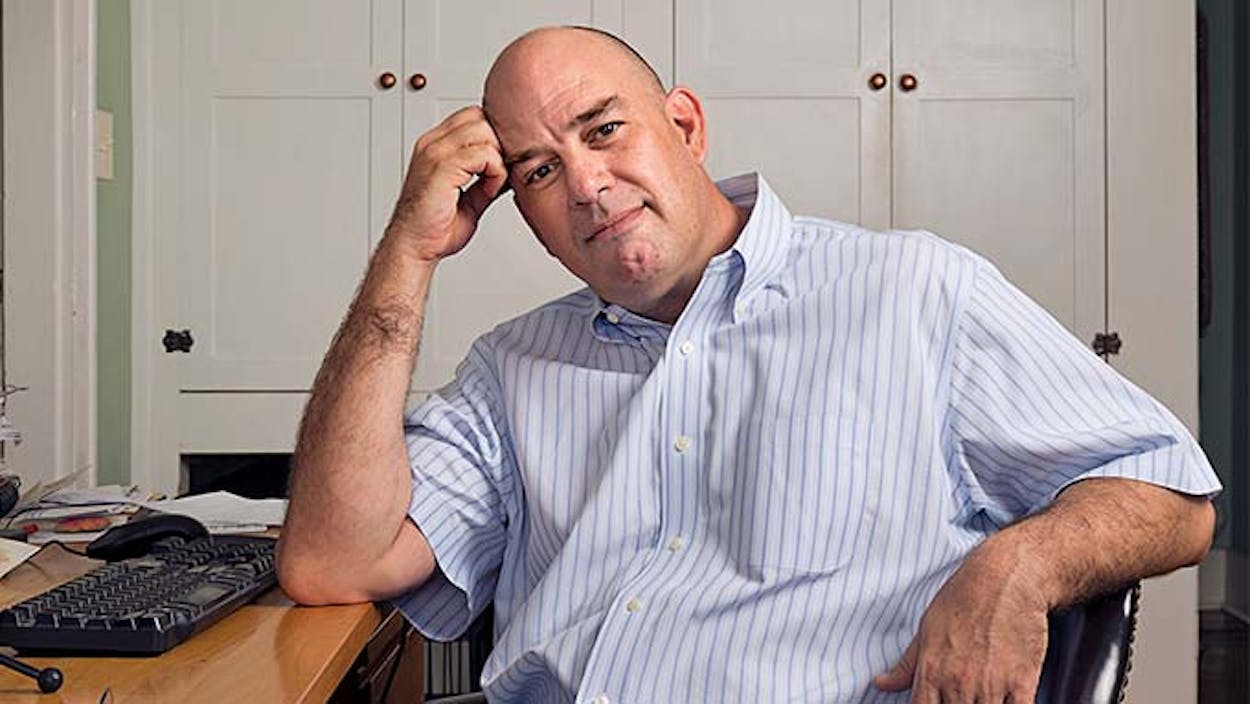Scott Henson has been infuriating people since his college days at the University of Texas at Austin, when he co-published a magazine called Polemicist, which took university officials to task for various misdeeds. After graduation, he wrote for the Texas Observer and worked as a political consultant, in the process learning the ins and outs of the Legislature. In 2004 Henson started the blog Grits for Breakfast, which rapidly became the go-to criminal justice forum in the state, in large part because of his no-holds-barred critiques of the criminal justice system. Seven years ago Henson was hired by the Lubbock-based Innocence Project of Texas (IPOT) as a policy director; in June he was named executive director of the organization, which is now moving to Austin.
Michael Hall: After a career chastising and criticizing those in power, it seems perfectly logical that you would wind up, at age 48, running the Innocence Project of Texas.
Scott Henson: That’s definitely an accurate narrative, though I don’t think it’s the driving one. I certainly didn’t decide “I want this job” and then go and build a résumé for it.
MH: When you were first hired at the Innocence Project, your expertise was working the Legislature.
SH: Yes, and taking issues that defense lawyers were grappling with and figuring out some way to turn them into legislation. In 2009 we got the Lege to increase compensation for exonerees from $50,000 to $80,000 for every year they were behind bars, and we encouraged them to create the Timothy Cole Advisory Panel [named for a Texas man who died in prison thirteen years into a sentence for a rape he didn’t commit]. It studied all the exonerations in the state and made recommendations to prevent future wrongful convictions, from reforming eyewitness ID procedures to recording interrogations to clarifying the standard for using junk science as a basis for a writ of habeas corpus.
MH: The “junk science writ” was passed in 2013 and then strengthened this past session. Where did the idea come from?
SH: I asked defense attorneys, “What are the big issues that y’all see as a barrier to getting more innocent people out of prison?” And this issue of using flawed forensic testimony as a basis for a writ of habeas corpus came up.
MH: Most of those Cole panel recommendations have now become law.
SH: All of them have passed except for recording interrogations. Texas is the first state to examine what reforms would help keep innocent people from being convicted, or get them out of prison if they’re already there.
MH: During the recent session, the Lege created an exoneration review commission, which you’ll be advising. What exactly will that group do?
SH: It will study the 112 Texas exonerations that have happened since 2009.
MH: But didn’t the Cole panel already examine wrongful convictions?
SH: Yes, but those were mostly DNA exonerations, which were usually sexual assault cases. We’re seeing fewer DNA exonerations now, because the stored DNA evidence is running out. We’re seeing a wider array of cases. There are a lot of drug cases, for example, where people have accepted pleas to get out of jail but it turns out they weren’t actually in possession of drugs, and the DA’s office didn’t find out until the crime lab report arrived six months later. They pleaded guilty because they didn’t want to lose their job or their apartment. If you can’t make bail, then you’re more likely to take the crappy deal. And it isn’t just drug cases where this happens. I mean, how many people in Waco after the Twin Peaks massacre were rounded up and given $1 million bond, and a bunch of them had been just sitting there in the restaurant? That dynamic points to a whole different set of issues. We’re starting to look at the front end of the process—at plea-bargaining issues and at pretrial detention. And I think other reforms will suggest themselves.
I’m really excited about the exoneration review commission—we have an opportunity to do some cutting-edge work that just hasn’t been done yet, figuring out what’s the next phase. It’s one of the reasons I agreed to take this job, even though it’s more of a managerial job than a policy one. I think we’re well situated to keep doing important work. The innocence frame, which really is at root an accuracy frame, is a very interesting lens through which to view the justice system.
MH: What do you mean by an “accuracy frame”?
SH: “You got the wrong guy. Get it right.”
MH: What are some of the specific things you want to do as executive director?
SH: In the past our litigation has mostly been handled by a handful of pro bono attorneys or law students at the Texas Tech clinic, and it’s been almost episodic. We haven’t been able to be proactive and strategic because we haven’t had a full-time staff attorney. I’m hoping we can hire a topflight staff attorney whose sole job is working for IPOT, somebody who’s a little older, has a little bit more experience.
MH: You’re moving IPOT to Austin.
SH: It won’t be based in Lubbock for long. That would have been a deal killer. Lubbock, we love you, but no.
MH: The Innocence Project has been working with the Texas Forensic Science Commission and the state fire marshal to review old arson cases. I’m guessing it’s unusual for a state fire marshal to collaborate with an innocence project.
SH: Yeah. But we’ve done something similar before: in 2007 we worked with the Dallas County DA, vetting cases in which inmates had asked for post-conviction DNA testing. That’s where we have, I think, found our niche: being a partner with unlikely allies. It doesn’t all have to be adversarial.
MH: You’ve always been careful on Grits to note that you work for IPOT. Can you continue to writ Grits when you actually run IPOT?
SH: Everyone likes the blog, everyone likes me to do a lot of free labor. And for me the blog is more utilitarian than most people realize. It’s not a public service; I know readers appreciate it, but it’s not for y’all. It’s mostly for me, so I can keep track of the issues I’m working on, so I can trot out arguments and new frameworks, new ways of looking at things, because my critics will be right there in the comments, telling me what I got wrong.
MH: What other criminal justice issues do you feel strongly about?
SH: Our incarceration rate is too high—we’re the epicenter of mass incarceration worldwide. Our population is 70 percent the size of California’s, but we have 30,000 more prisoners than they do. We’ve closed three prisons; I’d like to see us close another thirty. Also, police misconduct is a big problem, although a lot of it is kept secret, especially in the larger police departments that operate under the state civil service code—all their disciplinary files are secret. You can’t manage what you can’t measure.
MH: On Grits you’ve been critical of people who focus too much on the death penalty.
SH: I have an iconoclastic view of the death penalty, and it’s one I certainly wouldn’t attribute to the Innocence Project. I’m of the view that all of us die, but not everyone spends his life locked up in a small box—a lifetime in solitary confinement is a worse fate than death. I also think that we should worry about all the people the system kills—people shot by cops, people who die because of crappy health care in prison, like Tim Cole, who died because he couldn’t get access to an asthma inhaler. My complaint to my friends who work on death penalty cases is that their debates suck all the oxygen out of the room. Death penalty cases are given outsized coverage by the press, and everyone wants to view the entire criminal justice system through that lens. That means you never get to talk about other important issues, like pretrial detention or mass incarceration. There are about 400 deaths a year in official custody, which is 40 times the number of people executed. There are plenty of people focused on those 10. I want to look at the other 390.









